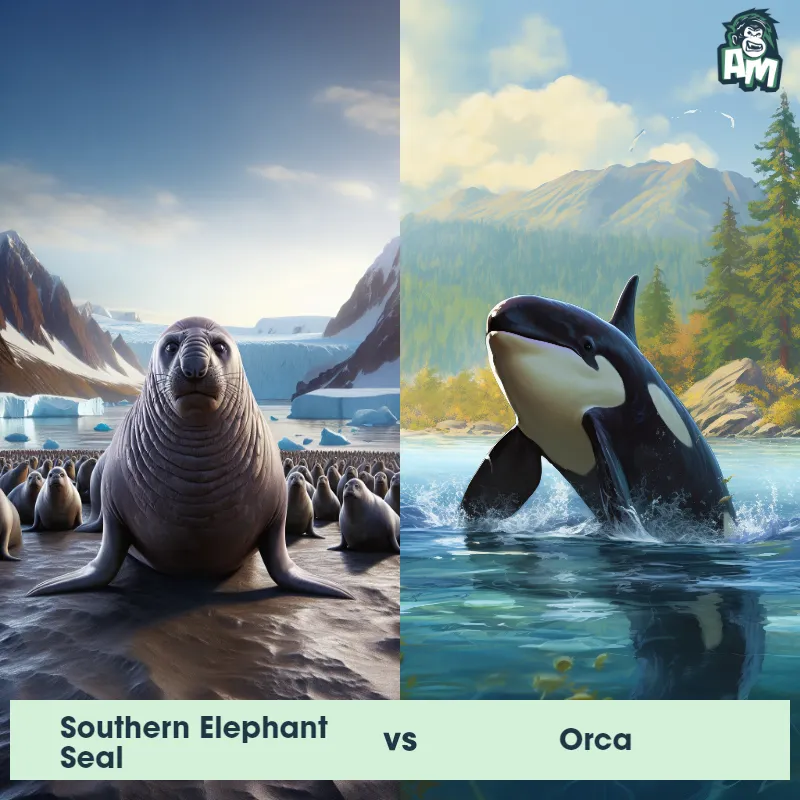The Southern Elephant Seal
The Southern Elephant Seal, also known as Mirounga leonina, is the largest seal species in the world. These marine mammals can reach lengths of up to 20 feet and weigh around 8,800 pounds. One of their most distinguishing features is their large, protruding noses, called "trunks," which males develop upon reaching sexual maturity. Southern Elephant Seals have a dark gray to brownish-black coloration with a lighter shade on their undersides. They are excellent divers and can hold their breath for up to two hours. These seals are found primarily in the sub-Antarctic and Antarctic regions.

| Southern Elephant Seal | |
|---|---|
| Size | Up to 20 feet (6.1 meters) in length |
| Weight | Up to 8,800 pounds (3,992 kilograms) |
| Speed | Speed: 8 mph (12.87 km/hr) |
| Key Strength | Powerful jaws and teeth |
| Biggest Weakness | Slow movement on land |
| Scientific Name | Mirounga leonina |
| Family | Phocidae |
| Habitat | Coastal areas and islands |
| Geography | Southern Ocean and Antarctica |
| Diet | Squid, fish, and krill |
| Lifespan | 14 years - 20 years |

The Southern Elephant Seal
The Southern Elephant Seal, also known as Mirounga leonina, is the largest seal species in the world. These marine mammals can reach lengths of up to 20 feet and weigh around 8,800 pounds. One of their most distinguishing features is their large, protruding noses, called "trunks," which males develop upon reaching sexual maturity. Southern Elephant Seals have a dark gray to brownish-black coloration with a lighter shade on their undersides. They are excellent divers and can hold their breath for up to two hours. These seals are found primarily in the sub-Antarctic and Antarctic regions.
Fun Fact: Southern Elephant Seals possess the ability to slow down their heart rate to conserve oxygen while diving, enabling them to reach incredible depths of up to 5,000 feet and stay submerged for extended periods.
| Southern Elephant Seal | |
|---|---|
| Size | Up to 20 feet (6.1 meters) in length |
| Weight | Up to 8,800 pounds (3,992 kilograms) |
| Speed | Speed: 8 mph (12.87 km/hr) |
| Key Strength | Powerful jaws and teeth |
| Biggest Weakness | Slow movement on land |
| Scientific Name | Mirounga leonina |
| Family | Phocidae |
| Habitat | Coastal areas and islands |
| Geography | Southern Ocean and Antarctica |
| Diet | Squid, fish, and krill |
| Lifespan | 14 years - 20 years |
Match Highlights
Southern Elephant Seal Matchups
We use AI to simulate matchups between the Southern Elephant Seal and other animals. Our simulation considers size, strength, and natural predatory behaviors to determine the most likely outcome.
Southern Elephant Seal: Diet, Predators, Aggression, and Defensive Behaviors
What do Southern Elephant Seals eat?
Southern Elephant Seals primarily feed on fish, squid, and crustaceans. They are deep divers, able to descend to great depths to catch their prey. Their diet mainly consists of mesopelagic and bathypelagic species found in the ocean depths.
Do Southern Elephant Seals have any predators?
As apex predators themselves, Southern Elephant Seals do not have natural predators as adults. However, pups and juveniles may fall prey to large sharks such as great white sharks and killer whales.
Are Southern Elephant Seals aggressive?
Southern Elephant Seals are known to be aggressive during the breeding season when males fight for dominance and access to females. They use their large size and sharp teeth to intimidate rivals.
Do Southern Elephant Seals fight?
During the breeding season, male Southern Elephant Seals engage in intense physical battles to establish dominance and secure mating rights. These fights can be brutal and often result in scars and injuries.
How do Southern Elephant Seals defend themselves?
Southern Elephant Seals primarily rely on their large size, strong jaws, and sharp teeth to defend themselves against potential threats. They can also use their agility and speed in the water to escape from predators.
What is the biggest weakness of Southern Elephant Seals in a fight?
Despite their impressive size and strength, Southern Elephant Seals have a vulnerable spot on their bodies - their necks. If an opponent is able to latch onto their neck during a fight, they can cause serious injury or even death to the Seal.
Fun Fact: Adult male Southern Elephant Seals are among the largest mammals on Earth, with some individuals weighing over 10,000 pounds and displaying aggressive behavior during mating season to establish dominance and secure access to females.
Fun Fact: When on land, Southern Elephant Seals tend to flip sand or gravel over their bodies as a way to keep cool and regulate their body temperature, as they lack the ability to sweat due to having limited sweat glands.

































